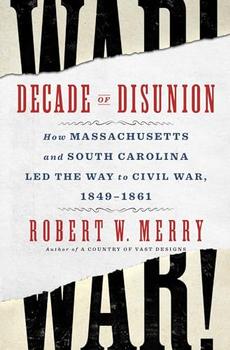
How Massachusetts and South Carolina Led the Way to Civil War, 1849-1861
by Robert W. Merry
Exploring a critical lesson about our nation that is as timely today as ever, Decade of Disunion shows how the country came apart during the enveloping slavery crisis of the 1850s.
The Mexican War brought vast new territories to the United States, which precipitated a growing crisis over slavery. The new territories seemed unsuitable for the type of agriculture that depended on slave labor, but they lay south of the line where slavery was permitted by the 1820 Missouri Compromise. The subject of expanding slavery to the new territories became a flash point between North and South.
First came the 1850 compromise legislation, which strengthened the fugitive slave law and outraged the North. Then in 1854, Congress repealed the Missouri Compromise altogether, unleashing a violent conflict in "Bleeding Kansas" over whether that territory would become free or slave. The 1857 Dred Scott decision—abrogating any rights of African Americans, enslaved or free—further outraged the North. And John Brown's ill-planned 1859 attack at the federal arsenal at Harpers Ferry stirred anger and fear throughout the South.
Through a decade, South Carolina, whose economy depended heavily on slave labor, struggled over whether to secede in a stand-alone act of defiance or to do so only in conjunction with other states. Meanwhile, Massachusetts became the country's antislavery epicenter but debated whether the Constitution was worth saving in the effort to abolish bondage. Both states widened the divide between North and South until disunion became inevitable. Then, in December 1860, in the wake of the Lincoln election, South Carolina finally seceded, leading the South out of the Union.
Beginning with the deaths of the great second-generation figures of American history—Calhoun, Webster, and Clay—Decade of Disunion tells the story of this great American struggle through the aims, fears, and maneuvers of the subsequent prominent figures at the center of the drama, with particular attention to the key players from Massachusetts and South Carolina.
This history is a sobering reminder that democracy is not self-sustaining—it must be constantly and carefully tended.
"A sweeping, invaluable history of the long prelude to the Civil War... . Merry employs consistently thorough and crisp prose, combining his best attributes as a journalist and historian... . Extraordinarily useful to readers no matter their level of familiarity with this particular period of American history. An essential volume for serious students of U.S. history, especially Civil War buffs." ―Kirkus Reviews (starred review)
"Based on extensive primary research, this detailed case study will magnetize readers interested in U.S. Civil War history and politics." —Library Journal (starred review)
This information about Decade of Disunion was first featured
in "The BookBrowse Review" - BookBrowse's membership magazine, and in our weekly "Publishing This Week" newsletter. Publication information is for the USA, and (unless stated otherwise) represents the first print edition. The reviews are necessarily limited to those that were available to us ahead of publication. If you are the publisher or author and feel that they do not properly reflect the range of media opinion now available, send us a message with the mainstream reviews that you would like to see added.
Any "Author Information" displayed below reflects the author's biography at the time this particular book was published.
Robert W. Merry is the author of five previous books, including President McKinley: Architect of the American Century and A Country of Vast Designs: James K. Polk, the Mexican War and the Conquest of the American Continent. He spent a decade covering Washington for The Wall Street Journal and served as an executive at Congressional Quarterly Inc. for twenty-two years, including twelve years as CEO. He also is the former editor of The National Interest and The American Conservative. He lives with his wife, Susan, in Langley, Washington, and Washington, DC.




Outside of a dog, a book is man's best friend. Inside of a dog it's too dark to read.
Click Here to find out who said this, as well as discovering other famous literary quotes!
Your guide toexceptional books
BookBrowse seeks out and recommends the best in contemporary fiction and nonfiction—books that not only engage and entertain but also deepen our understanding of ourselves and the world around us.